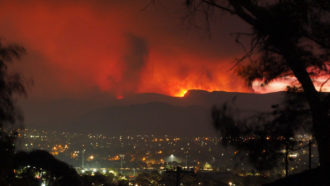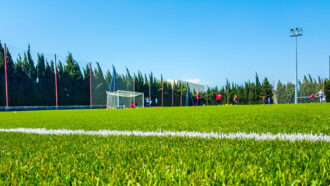Science & Society
-
 Psychology
PsychologyStruggling to find happiness? Here are some paths to positivity
Teens can become happier by being kind to themselves and connecting with others — in person, rather than online.
-
 Animals
AnimalsMagic helped this researcher trick birds for research
At the National University of Singapore, Elias Garcia-Pelegrin looks at how magic can help us understand animal intelligence.
-
 Environment
EnvironmentScientists want to create a sort of Noah’s Ark on the moon
Climate change is threatening Earth’s biodiversity banks. A lunar “ark” would safeguard seeds and cells against changes happening on Earth.
-
 Artificial Intelligence
Artificial IntelligenceChatGPT and other AI tools are full of hidden racial biases
In tests, AI programs would recommend people who use African American English for less prestigious jobs and harsher punishments for serious crime.
By Sujata Gupta -
 Artificial Intelligence
Artificial IntelligenceTwo AI trailblazers win the 2024 Nobel Prize in physics
John Hopfield and Geoffrey Hinton used brain-like networks based on principles of physics to jump-start machine learning.
By Emily Conover and Lisa Grossman -
 Science & Society
Science & SocietyLet’s learn about the Nobel Prize
Nobel Prizes are the highest honors in science. But the prizes are far from perfect measures of scientific impact.
-
 Space
SpaceSpacecraft need an extra boost to travel between stars
Star Wars makes space travel look easy by breaking the laws of physics. Off-screen, the technology for spacecraft to reach other worlds doesn’t exist yet.
-
 Climate
ClimateLet’s learn about how much climate change is to blame for extreme weather
Scientists can find out whether a natural disaster was more frequent or severe due to human-caused climate change. Here’s how.
-
 Health & Medicine
Health & MedicineUse of injectable GLP-1 weight-loss drugs skyrockets among teens
Their long-term safety is still an issue for kids. Meanwhile, a new vibrating robotic pill in early trials might offer an edible alternative to GLP-1s.
-
 Humans
HumansRain Bosworth studies how deaf kids experience the world
This deaf experimental psychologist has found that babies are born ready to learn sign language, just like spoken language.
By Meghan Rosen -
 Tech
TechNew system uses evaporation to greatly cool artificial turf
It relies on rainwater that gets stored below a field of plastic "grass." The design also limits how much rain — and pollution — will run off artificial turf.
By Laura Allen -
 Tech
TechWant to spot a deepfake? Focus on the eyes
A technique from astronomy could help detect deepfakes by spotting unrealistic reflections in the eyes of AI-generated images.
By Ananya